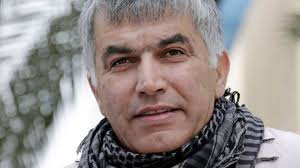
RNA - On Sunday, the group called for Rajab’s release while noting that his incarceration demonstrates the Manama regime’s lack of respect for human rights.
“Bahrain keeping Nabeel Rajab in a prison cell for criticizing abuses shows the ruling Al Khalifah family’s deep contempt for basic human rights,” said the group’s deputy Middle East director, Joe Stork.
“States that claim to support peaceful activism should use the Human Rights Council session to demand Rajab’s immediate release,” he added.
The council’s next session is set for September 13 in Geneva.
Rajab, who has been repeatedly detained for organizing anti-regime demonstrations and publishing posts critical of the ruling family, was pardoned for health reasons last year. However, the 51-year-old campaigner was rearrested again on June 13.
Rajab will be tried over tweets he posted in March 2015 criticizing Manama’s involvement in the deadly Saudi aggression against Yemen and torture at Bahrain’s notorious Jaw Prison.
In June, his family said Rajab was suffering from health problems and that Manama was not giving proper access to medical facilities.
"Nabeel never suffered heart problems before," said Sumaya Rajab, Nabeel's wife, in a statement. "My husband is a human rights defender and does not deserve this treatment,” she added.
Bahrain, a close ally of the US in the Persian Gulf region, has seen a wave of anti-regime protests since mid-February 2011.
Scores of people have been killed and hundreds of others wounded or detained amid Manama’s ongoing crackdown on dissent and widespread discrimination against the country’s Shia majority.
111/847/C